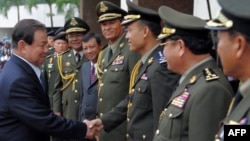Human Rights Watch has called for the removal of the military police chief, Sao Sokha, after he said he was inspired by the tactics of Adolf Hitler.
Sao Sokha commands 10,000 military police, and his forces have been behind some of the most brutal crackdowns on demonstrators and dissidents in recent years. In a public speech recently, he said he had “learned from Hitler.”
“Hitler, after Europe, after World War I, the international community – at that time there was not yet a United Nations – imposed that there be a total of only 100,000 troops. So how were Hitler and the Nazis able to marshal an army to make World War II?”
In a statement, Human Rights Watch said he should be removed from his post.
“Cambodia’s donors should call for Gen. Sao Sokha, commander of the 10,000-member Royal Khmer Gendarmerie and long-time stalwart of the ruling Cambodian People’s Party, to be removed from any role in the state security forces,” the group said in a statement Monday.
In interviews with local media, Sao Sokha has backed away from his statements, saying the lesson he learned was to teach his forces “what is bad and what is good.”
But Brad Adams, Asia director for Human Rights Watch, says Sao Sokha is typical of the type of commander Prime Minister Hun Sen employs to counter his opponents.
“Gen. Sao Sokha’s open hostility to the political opposition is made all the more disturbing by his ‘lessons learned’ from Adolf Hitler,” Adams said in the statement. “It is people like Sao Sokha, with a long record of human rights abuses, that Prime Minister Hun Sen has relied upon to maintain his abusive rule in Cambodia for the past 30 years.”
On Tuesday, Sao Sokha told VOA Khmer he stands by comments made to media. Asked whether he would resign, he said: Adams “can say whatever he wants.”
In the context of police behavior, rights groups say Sao Sokha’s comments matter. The military police were part of a brutal crackdown on labor and opposition protesters in late 2013 and early 2014, where at least five people were killed. Many more were severely beaten and are still struggling with health problems.
Ou Virak, head of the Future Forum, a think tank, said Sao Sokha should find a better role model. “When he looks up to cruel people, he treats Cambodian people just as badly and as cruelly.”
Am Sam Ath, monitoring supervisor of the rights group Licadho, said the commander should not learn from infamous people like Hitler.
In his own speeches, Hun Sen has said Sao Sokha’s statement was an exaggeration. Hun Sen told a group of students in Svay Rieng province that he himself does not follow the example of Hitler.
Nevertheless, the incident does show a continued animosity towards the opposition. Pa Socheatvong, the governor of Phnom Penh and supporter of Sao Sokha, said recently “the enemy” continues to be, “in other words, the opposition party.”
Contacted last week, Pa Socheatvong said Sao Sokha’s words have been misinterpreted. He said survivors of the Khmer Rouge learned something from them, “but we do not use the Khmer Rouge [techniques].”
He also asked a reporter not to use the word “crackdown” in describing the police actions against protesters last year. “It’s a heavy word,” he said. “Securing social order” was better, he said. Otherwise, “what is the point of having police and military police?”
Human Rights Watch maintains that military police under Sao Sokha have been systematically abusive. The group noted not only the killings of protesting workers, but the murder of environmental activist Chut Wutty and the shooting death of a young woman in Kratie province during a crackdown against protester there.
“Sao Sokha’s record and policy pronouncements make clear that he is incapable of political neutrality or leading the gendarmerie as anything other than a force of CPP repression,” Adams said in the statement. “Donors wanting to see genuine reform of Cambodia’s security forces should make respect for human rights and non-partisanship a requirement for all police, military and gendarmerie commanders.”




